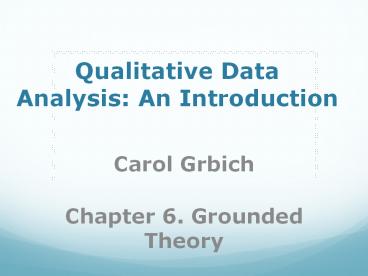Qualitative Data Analysis: An Introduction - PowerPoint PPT Presentation
Title:
Qualitative Data Analysis: An Introduction
Description:
Qualitative Data Analysis: An Introduction Carol Grbich Chapter 6. Grounded Theory Grounded Theory Use for exploring relationships or observing micro interaction Use ... – PowerPoint PPT presentation
Number of Views:242
Avg rating:3.0/5.0
Title: Qualitative Data Analysis: An Introduction
1
Qualitative Data Analysis An Introduction
- Carol Grbich
- Chapter 6. Grounded Theory
2
Grounded Theory
- Use for exploring relationships or observing
micro interaction - Use where little previous knowledge exists
- Developed by Barney Glaser and Anselm Straus who
wanted to develop theory from data in the real
world - Current versions include
- Barney Glasers version
- Anselm Strauss version
- Kathy Charmez constructivist Grounded theory
version - Postmodern and conjoint orientations
3
Grounded theory assumptions
- Assumptions underpinning GT- Symbolic
Interactionism presumes reality is constructed
and social processes can be created and changed
by interactions among people, - Meaning is constructed through symbols, signs
and language, and our ability to take the
position of others through the I (the
uninhibited self) and the me (the societal
controls reflected in the attitudes, values and
behaviours of significant others). - The focus in grounded theory is - the empirical,
social world out there viewed as comprising
many different layers, and public and private
views.
4
Differences between Strauss Glaser
- Glaser Strauss
- Style discovery verification
- Question problem variations
dimensionalising critiquing - Process emergent directions coding
hypothesis testing - Lit. review ongoing from 1st when
categories emerge - if desired - Category identification
- Coding constant comparison 3 levels of
data fracturing - Open coding words, lines, sections
words, lines paragraphs - Axial coding unnecessary meticulous
procedure - Selective coding core variables only
core categories to other categories - Theory theory generation
theory
verification
5
Strauss grounded theory
- Dimensionalising and sub -dimensionalising
(research question) - Open coding (data opening up through questioning)
- Memos (detailed summation of observation and data
linking to concepts and literature) - Axial coding (grouping of categorical data)
- Selective coding (linking of core categories with
memos and literature - Integration (putting it all together)
6
Glasers Grounded theory
- No data fracturing
- Constant comparison of incident to to incident
and to emerging concepts - Use of open coding, theoretical sampling and
constant comparison techniques - Group emergent categories, generate connections
and link to literature
7
Theoretical sensitivity
- A process of becoming steeped in the literature
using the variables emerging from the data and
seeking conceptual and theoretical connections to
provide interpretations in the generation of new
theory (Glaser) - Linking of data and theory more for verification
rather than generation of new ideas but being
careful not to let existing views bias your
perceptions. (Strauss)
8
Development of formal theory
- Identify the core category to be developed
- Open code and write memos of an example of the
data in which this category occurs - Theoretically sample in a range of different
areas - Continue until a wide range of sources have been
covered Strauss (1987241-2) - Criteria for evaluating substantive / formal
theory - Fit the link between the theory and the arena
where it will be used to provide insight needs to
be clear - Understandability will the theory be meaningful
to those who dont work in the area from which
the data has been collected? - Generaliseability the theory needs to be
meaningful in a large range of areas - Control does the theory empower users within
the field with knowledge to improve their
situation? (adapted from Glaser and Strauss,
1967237)
9
Criticisms of Grounded Theory
- A focus on a quasi-objective centred researcher
- Existing theories cannot be ignored by avoiding a
literature review, the researcher invariably
comes to the research topic bowed under the
weight of intellectual baggage from his/her own
discipline. - There is a focus on a complex method and
confusing and overlapping terminology rather than
data. - Poorly integrated theoretical explanations tend
to be the outcome
10
Charmezs Constructivist Grounded Theory
differences
- Researcher and researched
- She challenges the previously objective distant
nature of the relationship between researcher and
participants - She refocusses on researchers and their critical
reflective role in the recognition and management
of their biases - Data accountability
- Immersion in and transposing raw data into memos
is one suggested way of keeping close and
accountable to data (maintaining participants
voices) - Using non-scientific writing styles closer to the
literary options available in postmodern
approaches forefronts voices of the researched































